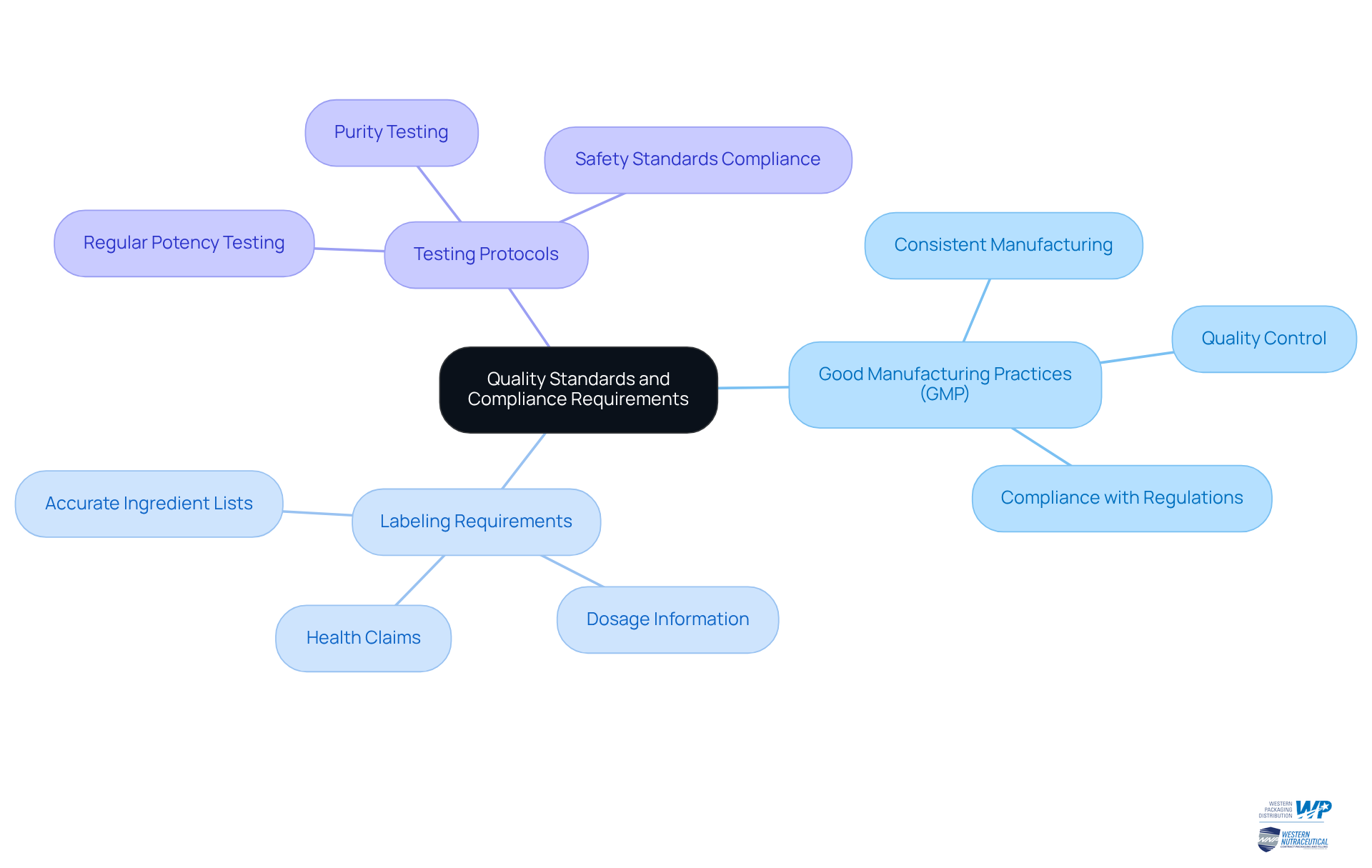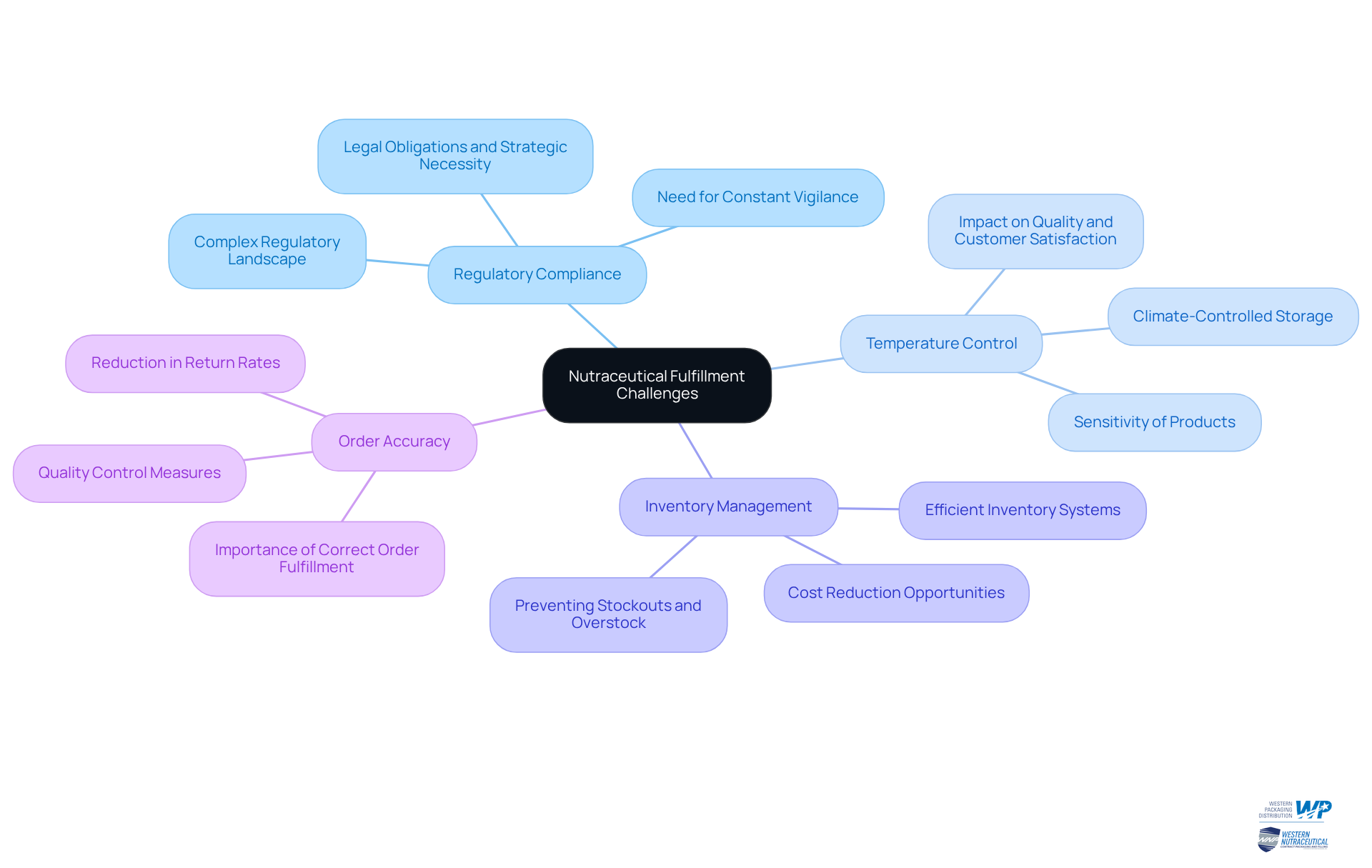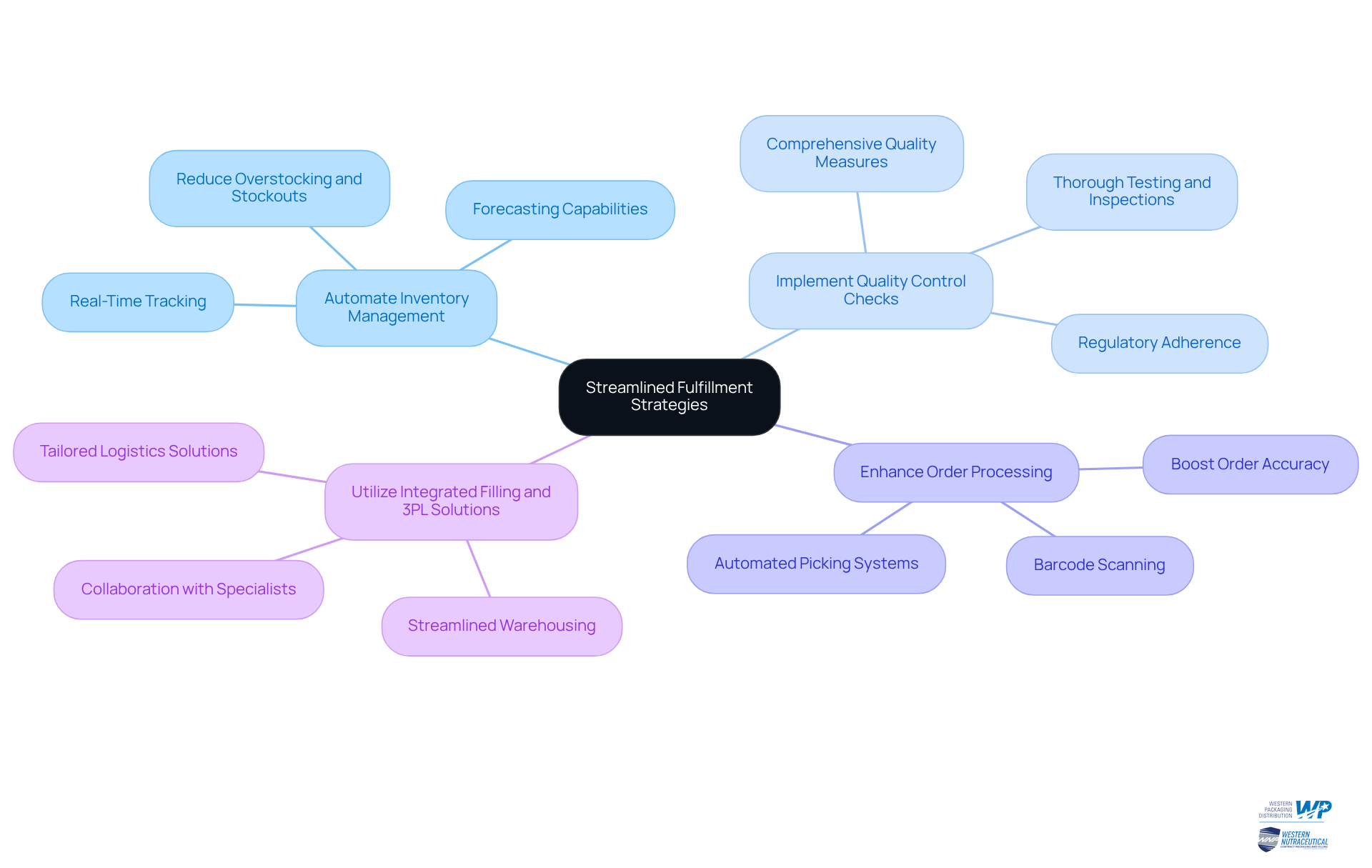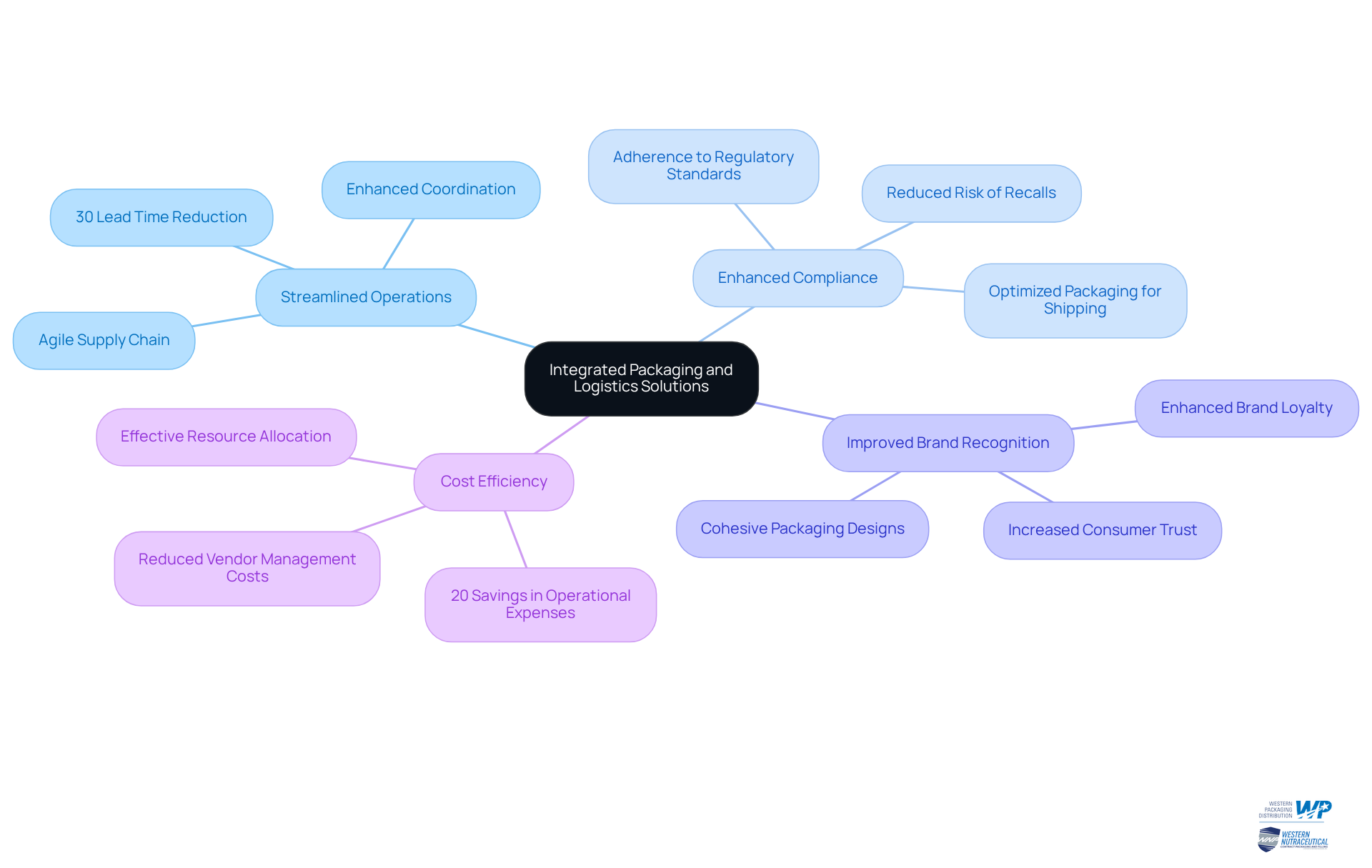Overview
This article delves into effective strategies for ensuring compliance and efficiency in nutraceutical fulfillment.
- Understanding regulatory requirements is paramount; it lays the foundation for operational integrity.
- Furthermore, implementing robust quality control measures is essential to safeguard product standards.
- By leveraging integrated logistics solutions, businesses can enhance operational effectiveness and build consumer trust in a complex industry landscape.
- These strategies not only streamline processes but also position companies as reliable players in the nutraceutical market, ultimately driving success.
Introduction
Navigating the intricate landscape of nutraceutical fulfillment requires a profound understanding of the ever-evolving quality standards and compliance requirements. As organizations endeavor to boost their operational efficiency, they encounter a myriad of challenges, ranging from regulatory obstacles to inventory management complexities.
How can businesses not only satisfy these compliance demands but also optimize their fulfillment processes to secure a competitive advantage in the health product market?
This article explores effective strategies that empower nutraceutical companies to achieve both compliance and efficiency, ultimately fostering consumer trust and driving growth.
Understand Quality Standards and Compliance Requirements
To effectively navigate the nutraceutical fulfillment landscape, companies must familiarize themselves with the relevant quality standards and . This includes a comprehensive understanding of the FDA regulations governing dietary supplements, which dictate labeling, ingredient safety, and manufacturing practices. Companies should implement a robust compliance strategy that encompasses:
- Good Manufacturing Practices (GMP): Ensure that all products are manufactured consistently and controlled to quality standards.
- Labeling Requirements: Accurately display ingredient lists, dosage information, and health claims to avoid misleading consumers.
- Testing Protocols: Regularly test products for potency and purity to ensure they meet safety standards.
By prioritizing these regulatory aspects, businesses can enhance their reputation and build consumer trust, ultimately leading to increased sales and customer loyalty through effective nutraceutical fulfillment.

Identify Common Challenges in Nutraceutical Fulfillment
Nutraceutical fulfillment poses unique challenges that significantly affect both efficiency and compliance. Understanding these challenges is crucial for companies aiming to enhance their operational effectiveness. Key issues include:
- Regulatory Compliance: The nutraceutical industry is characterized by a complex regulatory landscape that demands constant vigilance. Frequent updates to regulations necessitate that companies stay informed and adaptable to avoid potential pitfalls. Experts emphasize that navigating these regulations is not just a legal obligation but a strategic necessity for maintaining market credibility and consumer trust. As Harrison noted, "At some point, plaintiffs’ attorneys are going to figure this out and sue you for foods that are unlawful under FDA rules," highlighting the importance of compliance in avoiding legal issues.
- Temperature Control: Many nutraceutical items, such as probiotics and certain vitamins, are sensitive to temperature fluctuations. This sensitivity necessitates strict and transportation solutions to maintain integrity and efficacy. Organizations that effectively apply these measures frequently experience enhanced quality of goods and customer satisfaction. For instance, studies indicate that maintaining proper temperature control can significantly reduce spoilage, which is vital for preserving consumer trust.
- Inventory Management: Accurate inventory management is crucial for preventing stockouts or overstock situations, both of which can lead to significant financial losses. Efficient inventory systems allow businesses to react quickly to market demands, ensuring that products are accessible when required without incurring additional costs. According to industry statistics, businesses that optimize their inventory management can reduce costs by up to 20%.
- Order Accuracy: Ensuring that orders are picked and packed correctly is essential for maintaining customer satisfaction and minimizing costly returns. Implementing robust quality control measures can significantly reduce errors, enhancing overall operational efficiency. A case study on a prominent health supplement firm revealed that enhancing order precision resulted in a 30% reduction in return rates, showcasing the financial advantages of efficient fulfillment methods.
By acknowledging and tackling these challenges, health supplement firms can adopt focused strategies that enhance their nutraceutical fulfillment processes while also ensuring adherence to changing regulations. This proactive approach ultimately results in enhanced operational efficiency and market competitiveness.

Implement Effective Strategies for Streamlined Fulfillment
To optimize fulfillment processes in the nutraceutical sector, companies must implement the following strategies:
- Automate Inventory Management: Leverage advanced inventory management systems that offer real-time tracking and forecasting capabilities. This approach not only streamlines stock levels but also enhances accuracy, reducing the risk of overstocking or stockouts.
- Implement Quality Control Checks: Establish comprehensive quality control measures at every stage of the fulfillment process. This involves thorough testing and inspections to guarantee quality and alignment with industry standards, which is essential for upholding consumer trust and regulatory adherence.
- Enhance Order Processing: Utilize technologies such as barcode scanning and automated picking systems to boost order accuracy and processing speed. These innovations can significantly reduce human error and improve overall operational efficiency.
- Utilize : Collaborating with a reputable provider like Western Packaging can streamline warehousing, distribution, and compliance management. Their integrated filling process accommodates a variety of products, including powders, gummies, and soft-gels, ensuring tailored solutions for inventory management and logistics. This collaboration enables organizations to focus on their core strengths while making certain that logistics tasks are managed by specialists.
By implementing these strategies, businesses can enhance nutraceutical fulfillment efficiency, reduce operational costs, and increase customer satisfaction, ultimately resulting in a stronger market presence in the competitive health product landscape.

Leverage Integrated Packaging and Logistics Solutions
An integrated approach to packaging and logistics offers significant advantages for nutraceutical companies:
- Streamlined Operations: By consolidating packaging and logistics, companies can achieve lead time reductions of up to 30%, enhancing coordination and responsiveness across departments. This integration minimizes delays and fosters a more agile supply chain.
- Enhanced Compliance: Integrated solutions ensure that packaging adheres to evolving regulatory standards, which is crucial in the nutraceutical sector. This alignment not only meets compliance requirements but also optimizes packaging for efficient shipping and storage, reducing the risk of costly recalls.
- Improved Brand Recognition: Cohesive packaging designs that resonate with marketing strategies can significantly enhance product appeal. Research indicates that well-designed packaging can increase consumer trust and brand loyalty, essential factors in a competitive market.
- Cost Efficiency: By consolidating services, organizations can reduce expenses related to managing multiple vendors for packaging and logistics. This streamlined approach can lead to , allowing businesses to allocate resources more effectively.
Leveraging integrated solutions empowers nutraceutical companies to enhance operational efficiency and strengthen their market presence, which is crucial for achieving nutraceutical fulfillment and positioning them for sustained growth in a dynamic industry.

Conclusion
Mastering nutraceutical fulfillment necessitates a comprehensive understanding of quality standards, compliance requirements, and operational efficiencies. By emphasizing regulatory adherence and implementing effective strategies, companies can significantly enhance their fulfillment processes. A proactive approach to compliance not only safeguards against legal pitfalls but also fosters consumer trust and loyalty, ultimately driving sales.
Key insights include the critical role of Good Manufacturing Practices (GMP), the necessity of accurate labeling, and the implementation of rigorous testing protocols. Moreover, addressing common challenges such as temperature control, inventory management, and order accuracy is essential for maintaining operational efficiency. Companies that embrace automation and integrated logistics solutions can streamline processes, reduce costs, and improve customer satisfaction, thereby positioning themselves favorably in a competitive market.
In conclusion, the significance of effective nutraceutical fulfillment cannot be overstated. By prioritizing compliance and operational excellence, businesses can meet regulatory demands and thrive in an evolving industry landscape. Embracing these best practices empowers companies to navigate challenges successfully, ensuring agility and responsiveness to market needs while enhancing their reputation and consumer trust.
Frequently Asked Questions
What are the key quality standards and compliance requirements for nutraceutical fulfillment?
Companies must understand FDA regulations governing dietary supplements, which include labeling, ingredient safety, and manufacturing practices.
What are Good Manufacturing Practices (GMP)?
GMP ensures that all products are manufactured consistently and controlled to quality standards, promoting product safety and quality.
What are the labeling requirements for nutraceutical products?
Labeling must accurately display ingredient lists, dosage information, and health claims to avoid misleading consumers.
Why are testing protocols important in nutraceutical fulfillment?
Regular testing for potency and purity is essential to ensure that products meet safety standards.
How can prioritizing regulatory aspects benefit businesses in the nutraceutical industry?
By focusing on regulatory compliance, businesses can enhance their reputation, build consumer trust, and ultimately increase sales and customer loyalty.




